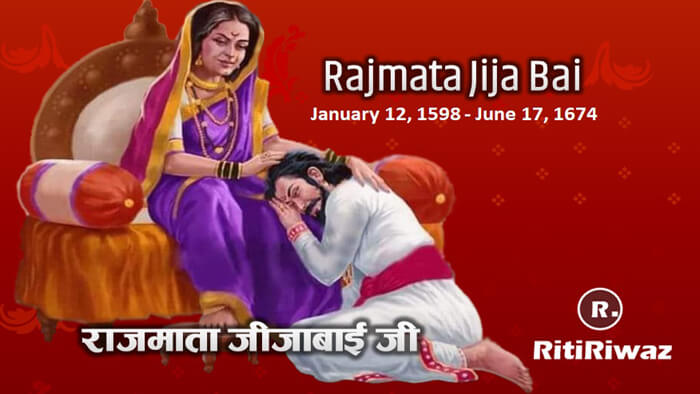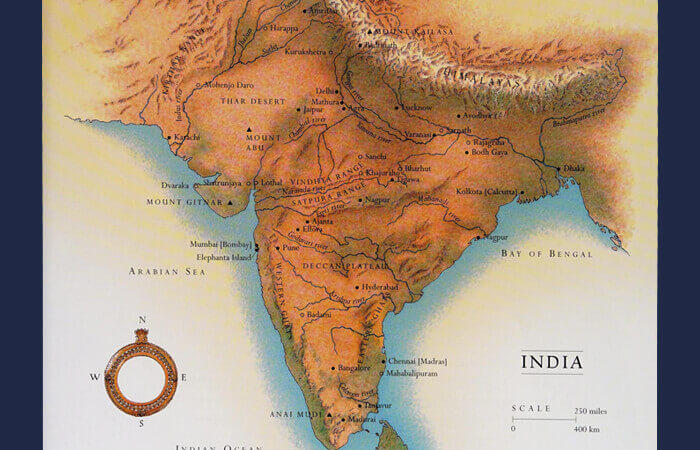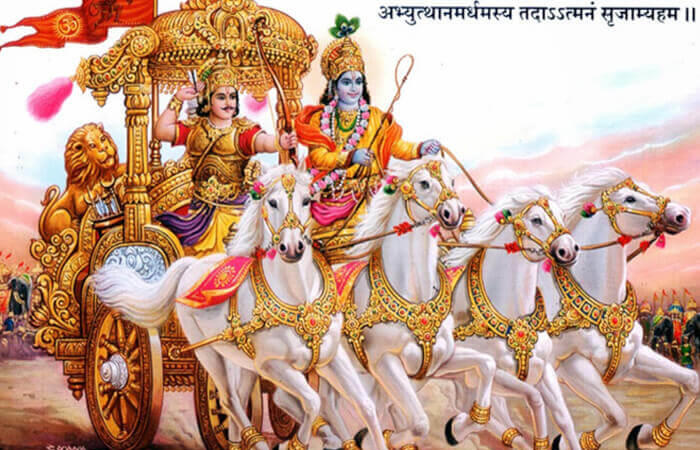Biography of Jijabai (1598-1674)

Jijabai is also known as Rajmata Jijabai, mother of Chhatrapati Shivaji Maharaj, founder of the Maratha kingdom. The mother of Shivaji, who was the protector of the country as well as religion. She was the guide who shaped his mind from his early years. She was the embodiment of self-respect. That great mother suffered in silence and became a source of inspiration to her heroic son.
The true importance of a mother in an individual’s life can be judged from the fact that while on one hand, she has been to be the first guru, on the other hand, the very heaven is said beneath her holy feet. Such a mother and brave woman were Jijabai who was not only his friend, guide but also a great source of inspiration. She never lost courage and patience in case of difficulties and adversities. She imparted moral values and ideals to her son.
As a result, her son grew up to be a great protector of the Hindu society and came to be known as Chhatrapati Shivaji Maharaj.
Early Life
Jijabai was born on 12 January 1598 in a village named Sindkher. Her father’s name was Lakhuji Jadhav and her mother was Mahalasabai Jadhav. Lakhuji Jadhav belonged to Deulgaon, near Sindkhed, in the present-day Buldhana district of Maharashtra. He was equally brave and ambitious and proud of his lineage. He was proud of his family and ancestry without being unduly clannish. Impresses by his enviable qualities, the Nizam made him the chief of an army. Jijabai was not only beautiful but was rich in qualities, her personality was a fine blend of her father’s courage and pride and mother’s qualities.
Jijabai was the only daughter of Lakhuji Jadhav, and as per the customs that prevailed in those days Jijabai was married at an early age (at the age of 8 years) to Shahaji Bhosle, son of Maloji Bhosle of Verul village. The wedding was held in Sindkhed on 5 Nov 1605. Jijabai was eight years old and her husband was hardly twelve years old. As per the custom of those days, Jijabai remained with her parents for several years before joining her husband.
Jijabai’s father-in-law, Maloji Bhonsle, had begun his career as a shilledar serving under the command of her father, Lakhujirao Jadhav. Her father was not happy with the marriage of his daughter due to the difference in the background and status of both families.
Jijabai bore Shahaji as many as eight children (six daughters and two sons). All the daughters died in infancy and only the two sons, Sambhaji and Shivaji, reached adulthood. Sambhaji was the elder son and Shivaji was the younger. In 1630, three years after Shivaji’s birth, Jijabai received a co-wife into her household after Shahaji married Tukabai.
Shahaji was a valiant, courageous, and brave Sardar of the Marathas. He himself aspired to establish a Swaraj. Initially, he was in the service of the Nizamshahi. He tried to save the Nizamshahi from the combined forces of Adilshahi and Mughals. But he could not withstand the combined forces of Adilshahi and Mughals. After the Nizamshahi wiped out, Shahaji became a Sardar in the court of Adilshahi.
He was granted Jagir of Bengaluru and as per the terms of the treaty forced to move to Bengaluru. While Shivaji and Jijabai were at Bengaluru, Shahaji provided excellent education to Shivaji. While Sambhaji was with his father Shahaji, in Karnataka, Jijabai along with young Shivaji and a few chosen associates shifted to Pune.
In those days, a large part of Maharashtra was under the rule of Nijamshah of Ahmadnagar and Adilshah of Bijapur. These two rulers were in a constant fight with each other to prove their dominance over the parts of Maharashtra. Along with these rulers, there are Siddis along the coastline of Konkan, the Portuguese, the British, the Dutch, and the French. All these foreign invaders constantly tried to prove their dominance over Maharashtra. Due to all these factors, there was instability and insecurity in Maharashtra. The condition of the common man was miserable.
There were many great Sardars of Marathas but they were worked either for the Adishah or Nizamshah. They concerned with their own jagirs and at constant conflicts with each other. Jijabai was not happy that her husband and her father were serving under the Muslim rulers. She always had a vision for an independent kingdom. Nijamshah deceitfully murdered Jijabai’s father Lakhuji Jadhav and his sons in his royal court. This incident had a deep impact on Jijabai.
An inspiration
Jijabai was a very pious and intelligent woman with a great vision for an independent kingdom. Shivaji grew up and began his fight for freedom. At the young age of sixteen, he captured the fort of Thorangadh. Shivaji would not take any important decision without consulting his mother. Jijabai is widely credited with raising Shivaji in a manner that led to his future greatness.
She inspired Shivaji by telling stories from Ramayana, Mahabharata. Right from his childhood, Jijau would tell Shivaji about the lives of Shriram, Maruti, Shrikrishna to make him pious and patriotic. Right from his childhood, she sowed the seeds of devotion to the nation. She instilled in him many values like courage, modesty, truthfulness, fearlessness. She inspired him to the establishment of Hindavi Swaraj. In Shivaji’s spotless character and courage, Jijabai’s contribution is enormous. It was through the efforts of Jijau that Shivaji became an Ideal administrator and ruler.
Even to Shivaji companions, Jijabai was a source of inspiration, she treated them as affectionately as she did her own son. She felt very sad like a mother when brave Maratha soldiers, after fighting heroically, fell one after another sacrificing their lives for their motherland.
After the news of Shivaji’s brother Sambhaji Maharaj’s death and her husband’s death, she was completely broke and could not manage herself. She died soon after the coronation of Shivaji on June 17, 1674, in the village of Pachad. Shivaji was heartbroken by her death, she was not only a mother to Shivaji but also a source of inspiration.
Jijabai has navigated through life without assistance, She had been wedded off at the age of seven. The moment she stepped into the Bhonsale household, she absorbed and adapted to their customs and traditions. She had cemented a concrete resolution in life – to cultivate Shivaji into an exemplary king, one who would abode by the ideals of secularism, whose subjects would have sufficient to survive on and in whose kingdom, the female species would be treated with due honor and respect. She realized this cherished dream through Shivaji.






